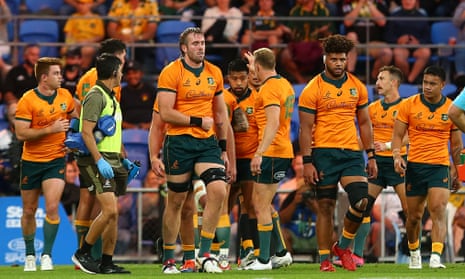Tremendous optimism is sweeping Australian rugby following World Rugby’s announcement that the country is the preferred candidate to host the 2027 World Cup. The governing body will make a final decision in May, but the sport’s showpiece tournament is now Australia’s to lose.
Rugby Australia chairman Hamish McLennan described hosting the World Cup as a “once-in-a-generation opportunity” and a chance to “reboot” the game in this country.
It would certainly be a golden opportunity for the cash-strapped game in Australia but, rather than a short-term financial fix, the event should leave a legacy that will help to secure the code’s future in the long term.
Unfortunately, this did not happen the last time Australian rugby was in this position 18 years ago, and the game is still paying for it.
RA received a $44m windfall for hosting the World Cup in 2003. Former chief executive John O’Neill wanted to invest the money in a future fund similar to the one established by the Australian Olympic Committee following the 2000 Games in Sydney.
But various stakeholders in Australian rugby wanted their piece of the World Cup pie and, rather than building wealth for the game, the windfall dwindled.
Rugby Australia cannot afford to make the same mistake twice. Earnings from the 2027 World Cup must be invested to ensure the financial growth of the game and protect it against unforeseen circumstances such as a coronavirus pandemic.
A future fund would have helped RA prevent the player exodus to Europe and Japan and assisted Super Rugby franchises during periods of financial stress. And it would enable RA and state unions to invest money in the most important growth area of the game – the grassroots.
Fortunately, RA seems to have learned its lesson, with McLennan saying any 2027 windfall would be put into an “investment vehicle to drive long-term sustainability”.
While McLennan’s words were heartening, Australian rugby cannot afford to rely on hosting the World Cup every 20 years or so to keep the code afloat. RA and the Super Rugby franchises must ensure any World Cup windfall is a bonus, not a lifeline.
It will be another five years before the 2027 tournament. If Rugby Australia is to fully capitalise on a successful event, the game in this country must be in good shape to begin with or the anticipated bonanza may not eventuate.
In 2003, rugby was competing with rugby league for popularity, but the game is now arguably the fourth football code in Australia behind league, Australian rules and football.
The first and most obvious thing Australian rugby must do is put players on the field who the fans want to watch. Within the current global rugby economy, that is not cheap.
RA and the Super Rugby franchises must find ways to improve their revenue streams. Clearly this is easier said than done, but that is the unmet challenge facing the game.
There is enormous potential for both the Wallabies and the Super Rugby teams, in particular, to increase their revenue by attracting bigger crowds. The best way to attract support is to win, but in professional sport that is a false economy because no team can win all of the time.
Fans have to feel a connection to their team, a sense of belonging to a community, to help them stick around in good times and in bad. It is not so much about watching your team win or lose as much as it is being part of the experience. So experience is what game day must provide.
An increase in crowds would potentially result in bigger television ratings and sponsorship dollars – the other two pillars which financially underpin the game.
Under the current broadcast agreement with Nine Entertainment, RA took a multimillion-dollar cutback in its revenue compared to the previous deal with Fox Sports and Network Ten. Better terms must be negotiated the next time around if the game is to be strong and healthy financially heading into the World Cup.
At present Nine Entertainment owns the broadcast rights to the Wallabies and Super Rugby, both on free-to-air and subscription TV.
It might be more lucrative to have separate free-to-air and subscription TV networks covering the game to leverage the products rather than one company showing the lot unless it was prepared to pay a premium.
If RA wants to receive another World Cup windfall, stadiums must be filled and eyeballs glued to television sets, but that has to be the aim every season, not just the year Australia hosts the World Cup.
RA made a mistake in 2003 by not investing what it earned, but it cannot afford to compound the error by thinking another jackpot alone will solve its financial problems.

Comments (…)
Sign in or create your Guardian account to join the discussion